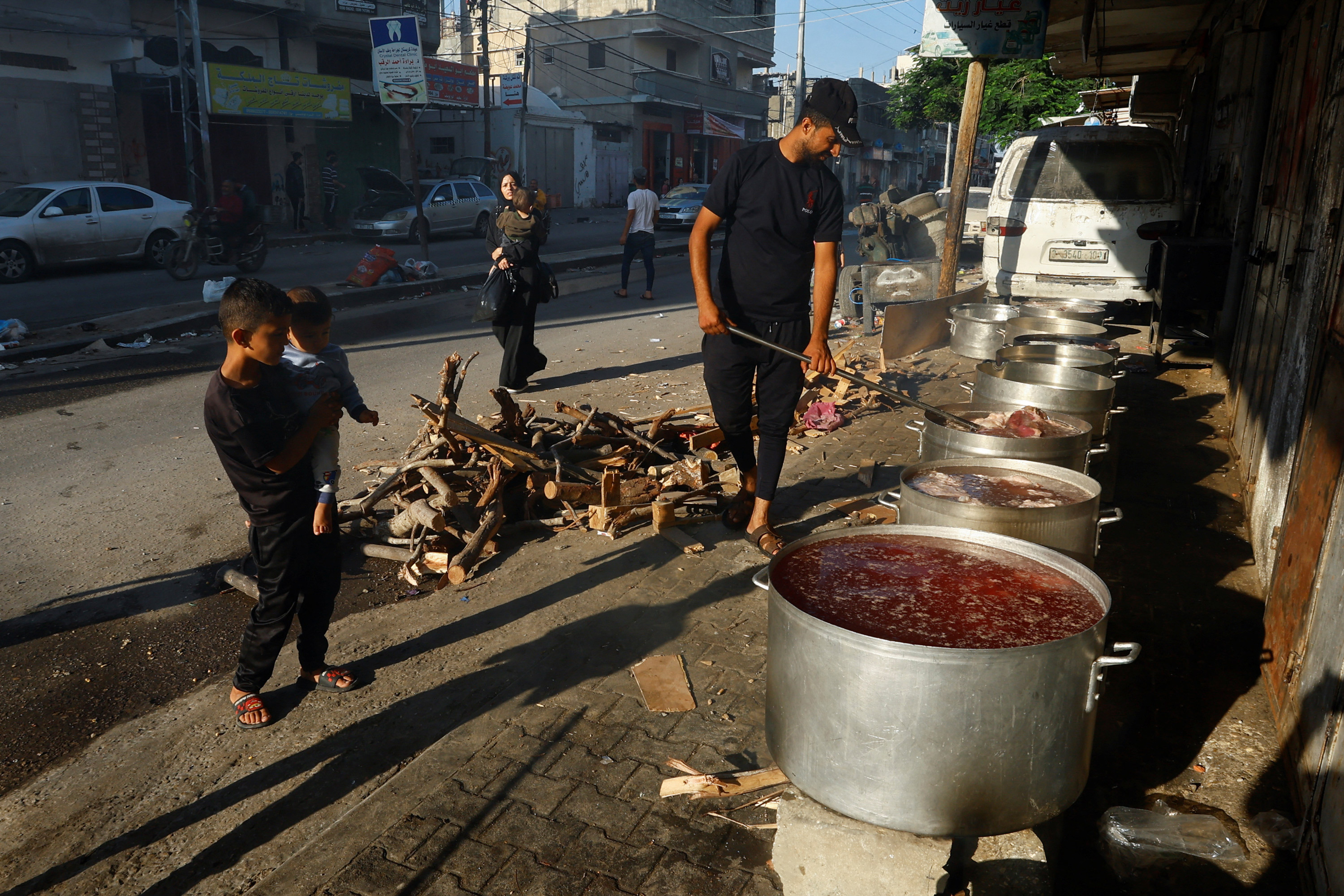Israel's Blockade Of Gaza: Fueling Hunger, Disease, And Crime

Table of Contents
The Impact of the Blockade on Food Security in Gaza
The Israel's blockade of Gaza severely restricts the import of essential food items, agricultural supplies, and fishing equipment, directly impacting food security. This leads to food shortages, malnutrition, particularly among children and vulnerable populations. The consequences are far-reaching and devastating.
Limited Access to Food and Resources:
The blockade's impact on food security is undeniable. The limited availability of essential resources has created a complex web of problems.
- High food prices: The restricted flow of goods leads to inflated prices, making nutritious food unaffordable for many families. This disproportionately affects low-income households, forcing them to make difficult choices between food and other necessities.
- Limited agricultural production: Farmers struggle to access seeds, fertilizers, and equipment, severely limiting agricultural output. This reduces the local food supply and increases reliance on imports, which are often restricted.
- Reliance on international aid: A substantial portion of Gaza's food supply relies on international aid organizations, a precarious and often insufficient solution to the crisis. Aid deliveries are frequently delayed or hampered by bureaucratic hurdles imposed by the blockade.
- Insufficient caloric intake among children: Malnutrition rates, especially among children, are alarmingly high due to inadequate access to nutritious food. This leads to stunted growth, developmental delays, and increased vulnerability to disease.
The Role of Border Crossings and Import Restrictions:
The few operational border crossings are frequently subjected to delays and stringent regulations, further exacerbating the food crisis.
- Delays in the delivery of aid: Even when aid is approved, bureaucratic delays and unpredictable closures of crossing points significantly hamper the timely delivery of essential food supplies. This creates shortages and leads to increased suffering.
- Bureaucratic hurdles: Complex procedures, lengthy approvals, and arbitrary restrictions imposed on specific food items create unnecessary obstacles and prolong the suffering of the Gazan population.
- Restrictions on specific food items: The blockade's restrictions extend beyond quantity, targeting specific food items deemed “dual-use” (with potential military applications), impacting the variety and nutritional value of available food.
The Devastating Health Consequences of the Blockade
The Israel's blockade of Gaza has crippled the healthcare system, leading to a devastating public health crisis. The lack of access to essential medicines, medical equipment, and specialized care has catastrophic consequences for the population.
Lack of Access to Essential Medicines and Medical Equipment:
The restricted import of essential medicines and medical equipment is a major contributor to the health crisis.
- Shortage of specialized treatments: Patients suffering from chronic illnesses or requiring specialized treatments often lack access to the necessary medications and equipment. This leads to preventable deaths and suffering.
- Inadequate hospital facilities: Gaza's hospitals struggle to function effectively due to shortages of essential supplies, equipment, and trained medical personnel. Overcrowding and limited resources hamper the provision of quality healthcare.
- Rising disease rates: The blockade has contributed to a rise in various diseases due to inadequate sanitation, lack of preventative healthcare measures, and limited access to treatment.
- Insufficient medical personnel: The brain drain of medical professionals seeking better opportunities elsewhere exacerbates the shortage of skilled healthcare workers within Gaza.
The Spread of Infectious Diseases:
Poor sanitation, inadequate healthcare, and overcrowded living conditions exacerbate the spread of infectious diseases.
- High rates of waterborne illnesses: Limited access to clean water and inadequate sanitation contribute to high rates of waterborne diseases such as cholera and typhoid.
- Increased prevalence of chronic diseases: Chronic diseases like diabetes and heart disease are becoming increasingly prevalent due to poor diet, lack of access to healthcare, and limited preventative measures.
- Lack of preventative healthcare measures: The limited resources and capacity of Gaza's healthcare system hinder the implementation of essential preventative healthcare measures, increasing the vulnerability of the population to disease.
The Rise in Crime and Social Unrest Due to the Blockade
The Israel's blockade of Gaza has devastated Gaza's economy, leading to widespread unemployment and poverty, which are key factors in the rise in crime and social unrest.
Economic Hardship and Unemployment:
The blockade has created a dire economic situation, with devastating consequences for the population.
- High youth unemployment: Unemployment rates, particularly among young people, are extremely high, leading to frustration, despair, and a heightened risk of involvement in criminal activities.
- Lack of economic opportunities: The blockade's restrictions on imports and exports have stifled economic growth and severely limited job creation opportunities.
- Increased poverty: Widespread poverty pushes many families to desperation, leading to increased crime rates and social instability.
- Desperation leading to crime: The lack of economic opportunities and the desperation to provide for their families drives many to engage in criminal activities to survive.
Social Tensions and Political Instability:
The blockade exacerbates existing social tensions and political instability, fostering a climate of fear and uncertainty.
- Increased social unrest: Frustration and despair over the dire living conditions have led to increased social unrest, protests, and clashes between different factions.
- Protests and clashes: The blockade has become a catalyst for protests and violent clashes, further destabilizing the region.
- Lack of hope for the future: The prolonged blockade and the lack of a clear path towards a better future fuel a sense of hopelessness and despair among the population, leading to social instability.
Conclusion
Israel's blockade of Gaza has created a catastrophic humanitarian crisis, resulting in widespread hunger, disease, and a significant increase in crime. The severe restrictions on access to essential resources, coupled with the crippling of the healthcare system and the economy, have created an unbearable situation for the civilian population. The impact extends far beyond immediate suffering, affecting generations to come. The dire consequences of this blockade demand immediate and decisive action.
Call to Action: Understanding the devastating consequences of Israel's blockade of Gaza is crucial. We must advocate for an end to these restrictive measures and demand immediate action to alleviate the suffering of the Palestinian people. Let's work towards a solution that prioritizes human rights and allows for the free flow of essential goods and services into Gaza, ultimately ending the Gaza blockade and its devastating consequences. We must demand an end to the siege and work towards a just and sustainable solution for the people of Gaza.

Featured Posts
-
 Vatican Conclave Profiling The Nine Leading Candidates To Replace Pope Francis
May 11, 2025
Vatican Conclave Profiling The Nine Leading Candidates To Replace Pope Francis
May 11, 2025 -
 Tom Hanks And Tom Cruises 1 Debt The Story Behind The Unpaid Role
May 11, 2025
Tom Hanks And Tom Cruises 1 Debt The Story Behind The Unpaid Role
May 11, 2025 -
 First Of Its Kind Ottawa And Indigenous Capital Group Ink 10 Year Deal
May 11, 2025
First Of Its Kind Ottawa And Indigenous Capital Group Ink 10 Year Deal
May 11, 2025 -
 Ufc 315 Fiorot Faces Shevchenkos Retirement Test
May 11, 2025
Ufc 315 Fiorot Faces Shevchenkos Retirement Test
May 11, 2025 -
 Osunas Injunction Denied Ineligibility For Tennessee Baseball Confirmed For 2025
May 11, 2025
Osunas Injunction Denied Ineligibility For Tennessee Baseball Confirmed For 2025
May 11, 2025
